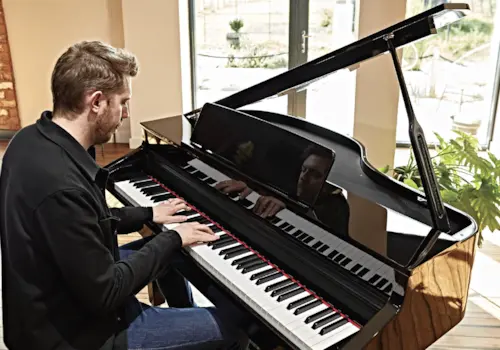Improve your church piano playing with these top pieces of advice
There are so many different music setups in church today; some have just an organist, some have a choir and a pianist, some have a small band, some have a large band, some sing traditional hymns and some sing modern songs. We’ve tried to cover as many of them as possible. No matter what type of church you attend, you are bound to find something of use to you below.
1. Find that perfect pocket of range
Accompanying a singer? One thing you want to avoid is playing in the same range as them. Unless you are matching their melody note for note, try and find another pocket of range to own. Do you have a high-pitched lead singer? Take the middle range of the piano. Do you have a singer with a deep voice? Play around with the top end of the piano. You'll notice the music sounds much more balanced.
2. Avoid over-using your left hand
Got a bass player in your band? Let them do their job! It’s really tempting to explore the lower end of the piano whilst you are playing, but if both you and the bass player are playing low-end notes, you are going to clash.
3. Always be prepared for a sudden change
Worship can change at any moment depending on where it is going. There might be a spontaneous period of praying between two songs that you and the band didn’t plan for. Always be prepared! Never lose your focus. If needs be, keep an eye on the lead vocalist (or the Music Director, if you have one) at all times as they may signal you to change chords, change songs, or change mood.
4. Less is more when improvising
These sudden changes may require you to improvise.
Remember that more is less. This is more likely to happen in a larger band setting. If that's the case, remind yourself that you are not the centre of attention in the band. Your aim here is to accompany whoever may be leading the spontaneity, and back them up with simple and clear playing.
Subscribe to Pianist to receive professional advice on how to improvise every issue.
5. Organise extra practice for you and the singers
This is especially useful for those of you that accompany a choir. There will be multiple vocal ranges being projected at once. At first, it might feel impossible for you to figure out where to play on the piano. Here are a few tips on how to complement their voices:
- Match the main melody note for note
- Play your improvisational melodies in between their melodies. That way, you are not clashing, but adding your own flavour within the gaps
- Stay on beat. You will likely be their only source of rhythm to follow
6. Learn the songs BEFORE band practice
Band practice needs to be spent bringing all the elements of the band together. It should not be spent learning the song from scratch. That is a waste of time.
Some practices will be spent specifically learning a brand-new song, and that is ok.
However, 90% of the time it needs to be spent honing tricky sections and working on rhythmic partnerships within the band.
Melanie Spanswick offers her top tips on mastering memorisation here.
Got more tips? Email the Pianist team with your ideas.







